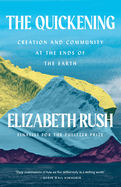
Elizabeth Rush, Pulitzer Prize finalist for Rising: Dispatches from the New American Shore, is no stranger to chronicling difficult narratives about climate change, and conveys profound urgency without ever descending into panic. In The Quickening: Creation and Community at the Ends of the Earth, she turns that skill to a most daunting task: joining the crew of the Nathaniel B. Palmer and the team of scientists attempting to gather data from Antarctica's never-before-explored Thwaites Glacier. The book takes an unusual structure: it is divided into four acts, and opens with a cast of characters, including the glacier itself, which Rush calls "the most important character in this play." A script-like accounting of the author's birth as told by her mother follows, an unexpected choice for what could have been merely a journalistic account of the expedition and its findings. But Rush eschews the expected here, interrupting narrative passages with fragmented dialogues lifted from the countless interviews she conducted with those on board--and weaving through it all her own story of becoming a mother.
As impressive as the structure is, it's at the sentence level that Rush's artistry shines, each description a pearl, and the string of them a thing of undeniable beauty. Rush is a journalist, with a scientist's curiosity and powers of observation, but she is also a poet, and sentences like this one demonstrate her formidable skills: "I get the sense that all afternoon, I have been eavesdropping on a conversation that has been taking place over hundreds and thousands of years, a conversation whose language is material, written in ice and rock and bone." --Sara Beth West, freelance reviewer and librarian

